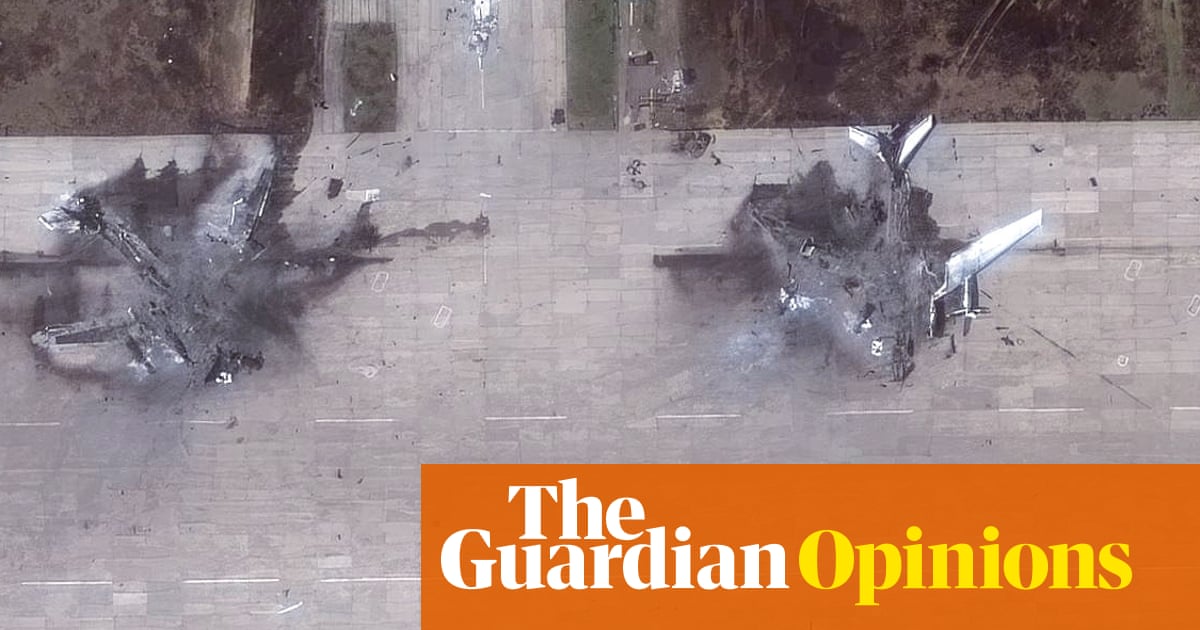Since Donald Trump scoldedVolodymyr Zelenskyywith the words “You don’t have the cards right now,” Ukraine has been keener than ever to demonstrate that it has a few up its sleeve. On Sunday it showed its hand with an extraordinary, audacious drone attack on multiple bases deep inside Russia, which it says damaged 41 aircraft.
Operation Spiderweb, which saw the smuggled drones released from their hiding places in wooden sheds and remotely piloted to their targets, was swiftly followed by another attackon Crimea’s Kerch bridgeusing underwater explosives. Kyiv – often coy in such cases – was unusually swift to claim both incidents, but has not taken responsibility for tworailway bridge attackswhich Russia says led to the deaths of seven passengers at the weekend.
There is obvious satisfaction in hitting Russian bombers and surveillance planes used against Ukrainian civilians, and Spiderweb’s unexpected method will surely force Russia to think harder about defence. But the greater significance lies in its potential impact on domestic morale and international support.Ukrainehas repeatedly surprised both its enemy and its allies throughout this war. Unexpected successes such as the Kursk incursion have changed the narrative at critical moments. Meticulously planned, and reportedly 18 months in the making, the latest operation must make Russia wonder what else may be on the way.
It was also spectacular enough to make Mr Trump pay attention. The US presidentreportedlyjudged the attack to be “badass”. But his cosy phone chats with Vladimir Putin appear to be locking in his tilt towards Moscow. On Wednesday hesaidthat, in a “good” conversation, Mr Putin had said he would have to respond. It did not appear to have occurred to the US president that discouraging retaliation might be desirable. He should be challenging Kremlin talking points instead of amplifying them. If Ukraine hoped to dispel the nuclear spectre which Russia has repeatedly summoned up, Mr Trump seems to be still in its thrall – withsome of those around himtalking up the threat again.
The Center for Strategic and International Studies arguedin a reportthis week that Russia’s military performance has been notably poor in this war, with gains coming at a strikingly high cost in terms of both equipment and personnel – hitting an estimated million casualties this summer. But Russia still has many more cards. It continues to grind out its advance, and in late May it launched itslargest drone and missile assaulton Ukraine to date. Its war of attrition may look old-fashioned compared with Kyiv’s innovations, but it still hurts. Meanwhile, talks in Istanbul have producedagreement on a prisoner exchangebut no movement towards peace.
There appears to be growing support in the US Senate for further sanctions on Russia, but Lindsey Graham isunlikely to movewithout Mr Trump’s acquiescence, and there is little sign of progress in the House. Pete Hegseth did not attend the session on Ukraine at Thursday’s gathering of defence ministers ahead of this month’s Nato summit – a telling absence, though the Pentagon blamed scheduling issues. Kyiv needs and deserves increased support from Washington, but damage limitation looks like a more realistic aspiration.
Ukraine continues to surprise, and to shift its approach as circumstances demand. Unfortunately, there is little sign of the US president, capricious as he is, changing course on this conflict.
Do you have an opinion on the issues raised in this article? If you would like to submit a response of up to 300 words by email to be considered for publication in ourletterssection, pleaseclick here.
